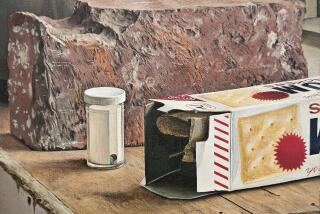Good Art Is Not Limited to Works of Provocation
Golly, here I am in Washington, trying to persuade people that the Los Angeles Times is superior to the local rag (which rhymes with toast and whose Style section specializes in politically correct profiles), when I notice a Calendar Page 1 personal attack on me by art critic Cathy Curtis (“Should the NEA Fund R&D;?” Feb. 11).
My crime was writing a Heritage Foundation report that criticizes the National Endowment for the Arts. Ms. Curtis begins by calling me “right-wing” (a term for anybody that progressives don’t like, from Charlton Heston to anti-Gorbachev Communists) and taking me to task for my admitted admiration for Norman Rockwell. Yes, I like Rockwell. His works will be studied and admired long after the bits of burlap so lauded by sophisticated critics such as Ms. Curtis have crumbled into dust. But for the record, I never said that art “should not concern itself with negative, downbeat subject matter,” just that I preferred uplifting art, particularly that which is beautiful. How naive of me.
But as uncharitable as Ms. Curtis, a former colleague, is to me, she reserves her most vitriolic prose for the tax-paying public, which she variously describes as “untutored,” “frankly art-ignorant,” and, using the progressive’s favorite description, “the masses.” From what I gather from her declaration of art as solely the province of “specialists,” “critics and curators,” her advice to beleaguered taxpayers is pretty much: “Shut up and hand over the money. We know what is good for you.” This elitism is the essence of the liberal, progressive vision, before which we must all genuflect or risk being called names.
We also are supposed to show more respect for the current arts Establishment, because, as Ms. Curtis reminds us, “today’s vanguard (of the proletariat?) becomes tomorrow’s mainstream.” I’m sorry. Impressionism is one thing, but (photos as graphic as some of Robert Mapplethorpe’s are) not going to be mainstream any time soon, not even in Ms. Curtis’ rosy progressive society. Or maybe (they) will, if we Neanderthals would just stop complaining and hand over our tax money to our betters.
Ms. Curtis attacks me and others “untutored in art” for the “one-track notion” that good art is “uplifting, ennobling or beautiful.” But she herself admits to the singular view that to be good, art must be “inherently provocative” and force us to “open our minds and reconsider our beliefs.” This means that art that does not assault our Judeo-Christian beliefs and values is by definition not good. Only in the strange, nihilistic world of late 20th-Century artistic elites has the silly notion taken hold that artists must be antagonistic toward their own culture to be true artists. Avant-garde--that is, experimental--art has a legitimate place, but it is by no means the only expressive work worthy of being called art. Ah, but for Ms. Curtis, the idea of excellence beyond the notion that anything goes is all too elusive: “Making art at any period of history is a crap shoot.” Having viewed some of what passes for art these days, I would have to conclude that she is at least half-right.
Ms. Curtis concludes by, in effect, calling me a Nazi, citing an L.A. exhibit that shows that the National Socialists, too, criticized the avant-garde art of their time. The implication of this guilt-by-association reference is profound and I will take proper measures. Hitler was a vegetarian, so I will warn my eggplant-loving friends to become copious consumers of Big Macs lest they be mistaken for S.S. thugs. And I will get down on my knees and ask my God if it is OK if I worship at the altar of the avant-garde for a while, just to be politically correct. If He doesn’t understand, well, I’ll jut have to give Him time “to get used to these new ways.”
ROBERT. H. KNIGHT
Knight is Senior Fellow for Cultural Policy Studies for the Heritage Foundation in Washington, and a former news editor for The Times Orange County Edition.
More to Read
The biggest entertainment stories
Get our big stories about Hollywood, film, television, music, arts, culture and more right in your inbox as soon as they publish.
You may occasionally receive promotional content from the Los Angeles Times.










